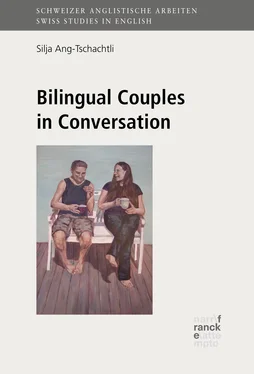5.2.3 Attitudeattitudes and motivationmotivation
Attitude is an essential component in language learning and may have a considerable influence on both language competence and language choice.20 Besides the attitudes of the two partners, the attitudes within their immediate environmentenvironmentattitudes of can also play a vital role. Thus, De Klerk discovered in a case study of ten bilingual South African couples that their choice between English and Afrikaans depended greatly on their personal attitudes, and that it was affected by the negative connotations Afrikaans had acquired in recent history (2001: 199). The Afrikaans-speaking partners in her study made more of an effort to learn English than their partners — some of the English speakers had not tried to learn their partner’s language at all (2001: 202–203). Moreover, nine of the ten couples conceded that, despite their intentions to raise their childrenchildrenraising bilingual bilingually, their family language had a strong inclination towards English (2001: 210). This indicates that bilingual couples’ attitudes will also influence the linguistic upbringing of their children (see also section 7.6, “The couples’ views on raising bilingual children”). The influence of attitude on language choice was also noted by Gal (1979), who studied German-Hungarian couples in the Austrian town of Oberwart and found that they were shifting toward the language with the higher symbolic value, which was German in their case.
In addition to the attitudes towards each language, the partners’ attitudes towards bilingualism itself may also affect their language choice. In the past, negative views on bilingualism used to be common, especially as regards childhood bilingualism, as it was often assumed that “increasing one language will automatically cause a decrease in the second language” (Baker 1988: 170), which was thought to potentially result in deficient language skills in both languages. Views towards bilingualism have generally become considerably more positive, but not concerning all types of bilingualism. Thus, attitudes towards bilingualism seem to be connected to aspects such as which languages are involved, the age of L2 acquisitionlanguage acquisitionsecond, possibly the bilingual’s level of educationeducationlevel of, as well as the situation within the community with regard to multilingualismmultilingualism. For the couples in this study, this means that the prevalent attitude towards bilingualism is probably much more positive in Switzerland than in the native countries of the Anglophone partners. Whereas many Swiss embrace their country’s multilingualism (see section 2.2, “Multilingualism in Switzerland”), such positive views of bilingualism are rare in English-speaking countries:
It is a cultural fact that no Anglophone nation anywhere has exhibited enthusiasm for any kind of bilingualism other than traditional. Only where English speakers are themselves a numerical, but elite, minority, as they used to be in South Africa, have they accepted bilingualism, but even there it is asymmetrical. There are many more speakers of Afrikaans who are bilingual than English speakers. (Romaine 1995: 324)
When bilingualism is met with scepticism, elements pertaining to bilingualism such as language mixing may be viewed equally critically; negative attitudes may thus inhibit the use of a mixed code (see section 6.2.1, “Factors that influence language mixing”).
In addition to the attitudes towards bilingualism and towards both languages, motivation has been determined as a key factor in second language acquisition and, consequently, in bilingual language use (Gardner and Lambert 1959). Language learning may be affected by many different motivational factors, which are generally divided into integrative and instrumental motives (Baker 1988: 152). Instrumental motivationmotivationinstrumental is mostly self-oriented, as there is “a desire to gain social recognition or economic advantages through knowledge of a foreign language” (Gardner and Lambert 1972: 14, in Baker 1988: 153). In contrast, integrative motivationmotivationintegrative tends to be other-oriented; it is “a concern to develop personal relationships with a group speaking another language” (Baker 1988: 153). Both instrumental and integrative motives may affect an individual’s desire to learn his or her partner’s language, and hence influence the language use within their relationship.
5.2.4 Identity and language emotionality
As has been mentioned earlier, being bilingualbilingualindividuals and biculturalbiculturalindividuals may be important for the partners’ sense of couple identity (see section 3.3.2, “Bilingual couples”), but it may also be linked to aspects of individual identityidentityindividual.21 A number of studies indicate that fluent bilinguals talk, act, view or experience things differently in their two languages. For instance, Ervin-Tripp showed that bilinguals sometimes complete the same sentence differently (in terms of content) depending on which language they are using (1964: 96). Koven, who examined narratives of personal experiences by two Portuguese-French bilinguals, demonstrated that they perform different kinds of “selves” in their two languages (1998: 436). In a later study on a Portuguese-French woman, Koven (2004) found differences in the bilingual’s performanceperformingself of affect and self in her two languages. To give an example, the woman claimed to be quieter and more reserved in Portuguese than in French. Koven argues “that it is not the structural differences of the two languages that account for [her differing performances], but rather, the repertoire of personas to which this speaker has access in each language” (2004: 471). Similar results were obtained by Marian and Kaushanskaya (2004), who compared narratives of English-Russian bilinguals, and tried to determine the effect of their languages on self-construal and emotional expression. They discovered that speaking in English brings about “a more individualistic self-construal, whereas speaking Russian [results] in a more collectivist self-construal” (2004: 197). These findings suggest that bilinguals may have a preference for using one or the other of their languages to express or perform themselves in a certain way.
As a consequence, bilinguals sometimes feel that they have multiple or fragmented selvesidentitymultiple, as can be seen in Pavlenko’s analysis of the manner in which multilingual writers position themselves in autobiographical narratives. In their writing, these writers frequently present themselves as “agents whose multiple identities are dynamic and flexible” (2001a: 319). Pavlenko believes that
[the] notion of self as fluid, fragmented and multiple […] allows the authors to explore the links between multiple languages and selves in ways that were previously non-existent and/or impossible: challenging the essentialist notions of self, deconstructing various ethnic, national, colonial, and gender identities, creating new discourses of hybridity and multiplicity […]. (2001a: 339)
Since language has a close connection to our feelings, thoughts and self-image, not speaking one’s mother tongue may engender feelings of loss of identityidentityloss of. Pavlenko notes that “[d]iscourses of language and identity commonly present mother tongue as the language of the self, of the heart, of one’s ethnic, national, and cultural identity, and argue that losing one’s language is tantamount to losing one’s self” (2005: 200). In the case of bilingual couples, moreover, it has been claimed that “the choice to become fluent in the partner’s language is a symbol of willingness to give up one’s own culture and language-based self in order to get along with one’s partner” (Rosenblatt 2009: 14). A bilingual couple’s language choice may hence also be influenced by concerns of identity, sacrifice and assimilationassimilation.
Читать дальше












